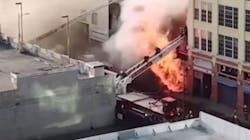Study: Fatigue Contributing to Rise in Maydays amid Pandemic
Firefighters across the country have been involved in more mayday calls since the start of the COVID-19 pandemic, according to a study that looked at more than 155 cases.
Project Mayday—an initiative started by former Warren Township, IN, Assistant Fire Chief Don Abbot to track maydays—found that distress calls have jumped 35 percent during a 13-week span running from the beginning of April until July 4. Those findings were culled from reports and interviews with mayday survivors from career fire departments.
Abbott, who began tracking maydays with his wife Bev in 2015, points to fatigued firefighters overworked because of understaffed departments as a major factor for the spike. Since the third week in March, departments were averaging eight to nine maydays daily, compared to five to six historically, according to Abbott.
But he doesn't put the increase solely at the foot of the current pandemic or, in some cases, civil unrest. If anything, these events have revealed staffing deficiencies brought on by economics and other factors.
"The pandemic has exposed a lot of fire departments in a lot of cities because we've gotten away from this stuff for so long," Abbott said. "Now it's caught up to us."
In the interviews, Abbott found the overwhelming majority of firefighters in maydays had been worked long hours past their normal shifts, sometimes for consecutive days. According to the study, 77 percent of maydays involved firefighters who were working past their normal hours. Of those, 23 percent involved firefighters who worked for 60 consecutive hours, while 17 percent involved firefighters who had worked for more than 72 consecutive hours.
In fact, the majority of the firefighters who participated in the study commented that they had no choice of working overtime hours, according to Abbott.
"People are tired," he said. "A guy I talked to for almost three-and-half hours was working his 71st hour when he had his mayday. And I asked him, 'What did you do?' And he said (he) went on runs, ate and didn't sleep much. Part of the problem is he thought the answer to the problem was Monster energy drinks. No, that ain't the answer to the problem."
But overworked firefighters aren't the only byproduct of understaffed departments, Abbott said. The "elephant in the room that nobody really wants to talk about," as he puts it, is sending firefighters in staff positions out on calls.
"Some departments have elected to put people in staff positions out in the field," he said. "Well, that's OK if those staff position people have been keeping up with training. And if they haven't, you're putting the crew that they're going to be on—and them—in jeopardy."
"My concern is that we've got some firefighters riding out of position," Abbott added. "We've got some firefighters acting as company officers, some company officers acting as battalion chiefs, and we haven't groomed them or trained them very well to do this in some departments."
Although Abbott's research has highlighted some of the underlying issues surrounding the increase in maydays, it hasn't uncovered a silver bullet to remedy the problem. To start, Abbott emphasized that a one-size-fits-all solution isn't out there.
"There's no one answer, and I don't think we can try to make it one answer for everybody," he said.
"The answer for a 160-person fire department ain't the same for a 4,000-person department," Abbott added. "The solution is looking at it from a variety of angles and trying to eliminate those problems and what are the variety of ways we can fix it. … What I'm fearful of is that everyone thinks we can write a paper and all the answers will be in that paper. No. I think some of the answers will be in that paper, but what works for a 4K person fire department is not going to work for a 160-person fire department."
The project also needs to conduct more interviews and gather more data during this pandemic era before it can suggest effective strategies to firefighters and departments.
"We need a little more data and numbers to crunch," Abbott said. "I think by September we might be in better shape to give some recommendations."
Abbott does have a few ideas, though, on areas that departments and chiefs should begin to address in order to bring down the number of maydays.
"First, I think elected officials need to understand the safety factor that occurs when you're operating out of your norm. That things that do happen, don't. Or if they do, they're very slow in developing," he said. "I think part of our challenge is that a lot of elected officials over the last four years as we came back from the recession, we've been our own worst enemy to a certain extent because the elected officials say, 'Hey, you know, we didn't hire anybody or we didn't cut people' or whatever happened. You guys are doing it with less people than what you used to, and it looks like everything is going well. And our normal response is,' Yeah, yeah, we're still doing the job.' But are we? And are we doing it safely? So I think that becomes an issue.
"The second part of it is we as administrators in the fire department understand what are realistic hours people can work, especially if they're coming from busy engine and ladder companies and going on overtime. … What do you expect is going to happen? They're fatigued, they're tired. I think from the administration standpoint, we've got to be realistic with what we're doing and how we're trying to do it."
Ultimately, Abbott hopes that the struggles and issues departments are encountering can become learning experiences that will help firefighters down the line.
"I hope (the pandemic) will end shortly, but it'll help us prepare for what the next one of these things will be, and we can look back and say here's the playbook because we learned lessons in 2020."
